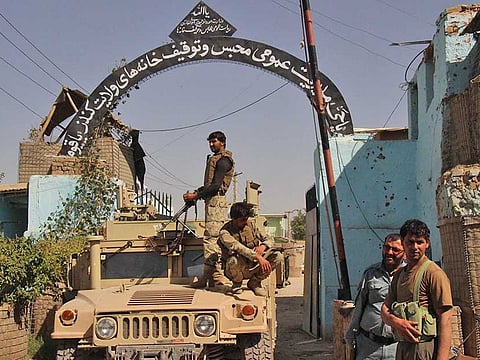Symptoms of Afghan occupation
The bombing of the MSF hospital in Kunduz should be a moment to reflect on the catastrophic policy failures of 14 years of US intervention

The Kunduz bombing is a symptom of the underlying disease of foreign occupation. The prescription requires that President Barack Obama keep to the timeline of withdrawing US troops by the end of 2016. The US military presence will not create long-term peace and stability in Afghanistan. On the contrary: as long as US troops are there, militants will fight to oust them.
On Tuesday, with protesters covered in fake ‘blood’ in the background, General John Campbell told the US Senate Armed Services committee that US forces had attacked the Medecins Sans Frontieres (MSF) hospital, also known as Doctors Without Borders, by accident. The Pentagon, he said, was carrying out its own investigation that would be “thorough, objective and transparent”.
But MSF isn’t buying it. The group says that the official stories from the US military and the Afghan government changed four times in four days, from “collateral damage” to accidental bombing to charges that Taliban fighters were using the hospital as a base of operations — a claim the aid group strongly disputed.
The group is calling for an independent investigation by the International Humanitarian Fact-Finding Commission, a body created in 1991 specifically to investigate violations of international humanitarian law but never before used. Dr Joanne Liu, president of MSF, says “the tool exists, and it is time it is activated”.
Only an independent investigation can uncover the facts we need to demand accountability and new safeguards to ensure this type of tragedy doesn’t happen again. The Pentagon baulks at the idea of an outside investigation, and Republican lawmakers at the hearing ridiculed the notion of an international body like the United Nations taking on the task. International pressure will be key to getting the US military to submit to an impartial and transparent probe.
Health care and compensation
But more is needed. The US government must be pressured to provide for the long-term health care needs of the wounded survivors and must compensate the families of the deceased. A new hospital must be built to replace the facility that was the only free trauma care hospital in northern Afghanistan, treating 22,000 and performing more than 5,900 surgical procedures in 2014.
The bombing should also be a moment to reflect on the 14 years of US intervention. This intervention has cost the lives of 2,350 US servicemen, plus the lives of thousands of Afghans and servicemen from our Nato partners.
It has cost US taxpayers over a trillion dollars (Dh3.67 trillion), money that could have made an enormous difference funding vital domestic needs. And what do we have to show for it?
Despite 14 years of US involvement at an estimated cost of $33,000 for every man, women and child in Afghanistan (or $14 million per hour since 9/11, according to one study), Afghanistan remains mired in poverty, corruption and political strife.
Misogynist culture
Despite the massive amount of effort spent on women’s empowerment, Afghanistan remains a deeply misogynist culture where only 17 per cent of women can read and write. Despite the massive effort to train and equip the Afghan army, Afghan soldiers have not been able rout the Taliban.
The American people have long soured on continued military involvement there. Responding to public sentiment, President Obama promised to cut the current force of 10,000 US troops in half by 2016.
In March, however, the president announced he would slow the pace of the troop withdrawal and now — with the resurgence of the Taliban — there is a call by many Congressional representatives to keep the troops there for years to come. There is even talk of sending more troops.
That is not the way forward. As Kunduz has shown, US involvement is not the answer to the instability and violence in Afghanistan. Now, what is needed most, are answers about this horrific bombing. And that must start with an independent investigation.
— Guardian News & Media Ltd
Medea Benjamin is co-founder of the peace group CodePink and author of many books, including Drone Warfare: Killing by Remote Control (2013).


